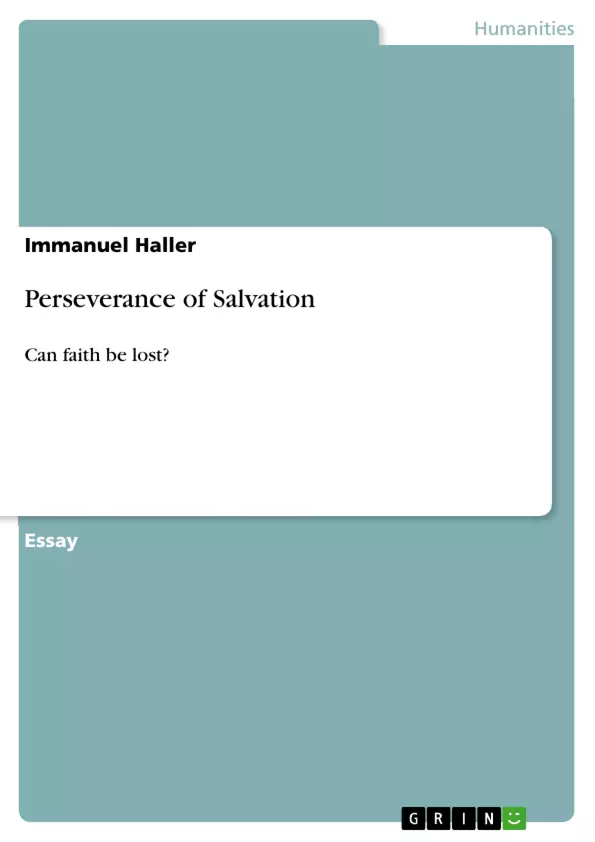While some would argue that “those who have true faith can lose their faith neither totally nor finally,” others believe that faith can be lost even though you have been a true Christian. This paper has the aim to compare Arminian and Calvinist traditions concerning the theology of perseverance of the believer and concluding with the writers’ view about this subject.
Inhaltsverzeichnis (Table of Contents)
- INTRODUCTION
- PERSEVERANCE OF SALVATION
- Calvinist Tradition
- Arminian Tradition
- Election
- Predestination and human freedom
- Before knowledge of God
- Perseverance
- Salvation
- Calvinistic Bible support
- Arminian Bible support
- Divine grace and the believers' responsibility
- CONCLUSION
Zielsetzung und Themenschwerpunkte (Objectives and Key Themes)
This paper aims to compare the Arminian and Calvinist perspectives on the theology of perseverance of the believer, concluding with the author's view on the subject. The paper focuses on the main thought which brought the author to the final conclusion that a real Christian can lose salvation.- Perseverance of the believer
- Comparison of Calvinist and Arminian traditions
- The doctrine of election
- Conditional vs. unconditional salvation
- The balance between divine grace and the believer's responsibility
Zusammenfassung der Kapitel (Chapter Summaries)
- Introduction: This chapter provides a brief overview of the paper's scope and purpose, which is to explore the difference between Arminian and Calvinist perspectives on perseverance of salvation. It also clarifies the paper's focus on the possibility of a true Christian losing salvation.
- Perseverance of Salvation: This chapter delves into the contrasting views of Calvinism and Arminianism on the concept of perseverance. Calvinists believe that God's election guarantees eternal life, meaning salvation cannot be lost. Arminians, however, argue that salvation is contingent upon faith and therefore can be lost through apostasy, or a deliberate rejection of Jesus.
- Election: This section explores the relationship between the doctrine of election and perseverance. Calvinists believe that God's election is unconditional, meaning those chosen for salvation cannot lose it. Arminians, on the other hand, maintain that God's predestination is based on his foreknowledge of those who will accept his offer of salvation.
Schlüsselwörter (Keywords)
This paper explores the central themes of perseverance of the believer, Calvinism, Arminianism, election, predestination, human freedom, salvation, and the relationship between divine grace and individual responsibility. It delves into the contrasting viewpoints on the possibility of losing salvation, highlighting the key doctrines that inform these perspectives.Frequently Asked Questions
What is the difference between Calvinist and Arminian views on salvation?
Calvinists believe in the "Perseverance of the Saints" (salvation cannot be lost), while Arminians believe salvation is contingent on continued faith and can be lost through apostasy.
What is the doctrine of election?
In Calvinism, election is unconditional (God chooses based on His will); in Arminianism, it is conditional (based on God's foreknowledge of who will believe).
Can a true Christian lose their salvation?
The author of this paper concludes that a real Christian can lose salvation, aligning more with the Arminian tradition of believer's responsibility.
How do Calvinists support their view with the Bible?
They emphasize verses about God's sovereign power and the promise that no one can snatch believers out of His hand.
What is the role of human freedom in predestination?
Arminians emphasize human freedom to accept or reject grace, whereas Calvinists see human will as secondary to God's sovereign decree.
- Arbeit zitieren
- Immanuel Haller (Autor:in), 2007, Perseverance of Salvation, München, GRIN Verlag, https://www.grin.com/document/196317



